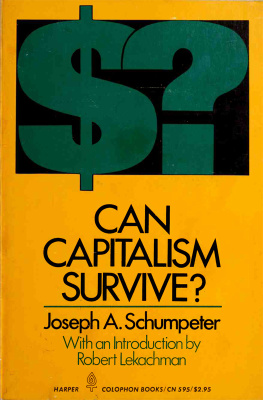Schumpeter - Capitalism, Socialism and Democracy
Here you can read online Schumpeter - Capitalism, Socialism and Democracy full text of the book (entire story) in english for free. Download pdf and epub, get meaning, cover and reviews about this ebook. City: London, year: 2010, publisher: Taylor & Francis;Routledge, genre: Politics. Description of the work, (preface) as well as reviews are available. Best literature library LitArk.com created for fans of good reading and offers a wide selection of genres:
Romance novel
Science fiction
Adventure
Detective
Science
History
Home and family
Prose
Art
Politics
Computer
Non-fiction
Religion
Business
Children
Humor
Choose a favorite category and find really read worthwhile books. Enjoy immersion in the world of imagination, feel the emotions of the characters or learn something new for yourself, make an fascinating discovery.
Capitalism, Socialism and Democracy: summary, description and annotation
We offer to read an annotation, description, summary or preface (depends on what the author of the book "Capitalism, Socialism and Democracy" wrote himself). If you haven't found the necessary information about the book — write in the comments, we will try to find it.
Capitalism, Socialism and Democracy — read online for free the complete book (whole text) full work
Below is the text of the book, divided by pages. System saving the place of the last page read, allows you to conveniently read the book "Capitalism, Socialism and Democracy" online for free, without having to search again every time where you left off. Put a bookmark, and you can go to the page where you finished reading at any time.
Font size:
Interval:
Bookmark:
Capitalism, Socialism and Democracy
a work with which no one who professes any degree of information on sociology or economics can afford to be unacquainted.
New English Weekly

Routledge Classics contains the very best of Routledge Publishing over the past century or so, books that have, by popular consent, become established as classics in their field. Drawing on a fantastic heritage of innovative writing published by Routledge and its associated imprints, this series makes available in attractive, affordable form some of the most important works of modern times.
For a complete list of titles visit
www.routledge.com/classics
Joseph A. Schumpeter
Capitalism, Socialism and Democracy
With a new introduction by Joseph E. Stiglitz

London and New York
First published in the USA
First published 1943 in the UK
First published in the Routledge Classics 2010
by Routledge
2 Park Square, Milton Park, Abingdon, Oxon OX14 4RN
Routledge is an imprint of the Taylor & Francis Group, an informa business
This edition published in the Taylor & Francis e-Library, 2010.
To purchase your own copy of this or any of Taylor & Francis or Routledges collection of thousands of eBooks please go to www.eBookstore.tandf.co.uk.
1976, 2010 George Allen & Unwin
Introduction 2010 Joseph E. Stiglitz
All rights reserved. No part of this book may be reprinted
or reproduced or utilized in any form or by any electronic,
mechanical, or other means, now known or hereafter
invented, including photocopying and recording, or in
any information storage or retrieval system, without
permission in writing from the publishers.
British Library Cataloguing in Publication Data
A catalogue record for this book is available from the British Library
ISBN 0-203-85709-7 Master e-book ISBN
ISBN 10: 0415567890 (pbk)
ISBN 10: 0203092953 (ebk)
ISBN 13: 9780415567893 (pbk)
ISBN 13: 9780203092958 (ebk)
|
Joseph E. Stiglitz
It is always a pleasure to reread Joseph Schumpeters monumental work, Capitalism, Socialism, and Democracy, a work that is as relevant today as when it was first published sixty five years ago. It has become a classic not only in economics but in political science. Terms like Schumpeterian competition and creative destruction have entered the lexicon, and there is an International Joseph A. Schumpeter Society promoting his ideas. The republication of his book is a good occasion to reflect on why his ideas have had such influenceand why perhaps they have not had the influence that they should.
Within the realm of economics, he argued against the competitive equilibrium model that prevailed thenand prevails today. This model, often referred to as the Walrasian model, after the French economist Leon Walras, who first gave it a mathematical articulation, or the ArrowDebreu model, after the two American Nobel prize winners, who established the conditions under which an equilibrium existed in such a model, and in which the equilibrium was Pareto efficient (efficient in the sense that no one could be made better off without making someone else worse off). It is the familiar demand and supply model taught in every economics principle course. And in this model, monopoly is the scourgemonopolies constrain output and raise prices.
To Schumpeter, the heart of capitalism was innovation, and innovation required some degree of monopoly power. Schumpeterian competition replaced competition in the market with competition for the market. If competition were perfect, innovators would not be able to appropriate any returns to their innovations, and without innovations, economies would stagnate. Writing after a period in which the capitalist economies performance was less than stellarthe Great Depression in which large fractions of the capital and human resources had been left idle, at greater human suffering, for an extended period of timehe could still look at the great sweep of history. Such fluctuations had happened repeatedly, and even taking the loss in output during such episodes into account, he noted the huge increases in living standards which capitalism had brought about, and which it was likely to continue to bring about. He was even optimistic about the elimination of poverty: with little evidence of an increase in inequality, as average incomes were increased, so too was it likely that those at the bottom would see new found prosperity. In spite of these long term successes, he was not sanguine about capitalism winning the political (or ideological) battle with socialism. One can see the book as his contribution to the intellectual battle that he saw as looming.
In a sense, Schumpeter won the day. No one today thinks of socialism as superior to capitalism as a way of organizing the production of goods and services. The increases in standards of living brought about by the market economy were beyond anything envisioned sixty years ago. The pace of innovation has been even faster than he expected. We talk today of the innovation economy.
Yet, in another sense, Schumpeter today is as much an outsider to the mainstream of the economics profession as he was three-quarters of a century ago. The equilibrium approach which he criticized so forcefully is still the dominant paradigm. And there is a new threat to capitalism, not from socialism, but from the right, from the capitalists themselves: Today, the issue is very much saving capitalism from the capitalists, from a form of statism that is far worse in some ways than socialism, something I have called corporate welfarism in which the power of the state is used to protect the rich and powerful, rather than the poor and society more generally. It is a failure borne out of limitations of the kind of competitive democracy that he trumpeted.
My own Principles textbook was, for instance, the first principles textbook to devote a chapter to the issues of innovation which Schumpeter thought were central to capitalism. In most graduate programs in economics, a little time is devoted to endogenous growth theory, the notion that the pace of innovation is determined by economic decisionsbut it a small fraction of the time that is devoted to the equilibrium theories based on models of perfect competition. The link between industrial structure and the pace of innovationthe focus of Schumpeters concernsis given scant attention.
1 It was some thirty five years after Schumpeters work that economists gave serious theoretical attention to the issue. See, for instance, P. Dasgupta and J. E. Stiglitz, Industrial Structure and the Nature of Innovative Activity, Economic Journal, 90(358), June 1980, pp. 266293 and Uncertainty, Market Structure and the Speed of R&D, Bell Journal of Economics, 11(1), Spring 1980, pp. 128.
Part of Schumpeters problem was one of language: he wrote in words, but the language of modern economics is mathematics. His ideas had to be translated, and as is often the case, much is lost in the process of translation. And yet, sometimes, something is gained. Mathematics allows greater precision in the articulation of the assumptions and the conclusions. Schumpeter talks of the virtues of capitalism in promoting innovation. He seems less concerned about monopoliesthey would, in any case, be temporary, as innovation leads one monopolist to be replaced by another. But economics is about the scarcity of resources, and the natural question for an economist is: does it allocate resources to innovation in an efficient way?
Font size:
Interval:
Bookmark:
Similar books «Capitalism, Socialism and Democracy»
Look at similar books to Capitalism, Socialism and Democracy. We have selected literature similar in name and meaning in the hope of providing readers with more options to find new, interesting, not yet read works.
Discussion, reviews of the book Capitalism, Socialism and Democracy and just readers' own opinions. Leave your comments, write what you think about the work, its meaning or the main characters. Specify what exactly you liked and what you didn't like, and why you think so.












